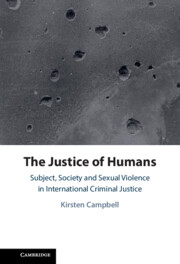Book contents
- The Justice of Humans
- The Justice of Humans
- Copyright page
- Dedication
- Contents
- Figures
- Acknowledgements
- Abbreviations
- Note on Case Citation Abbreviations
- 1 The Justice of Humans?
- Part I Subjectivity and Sociality in Contemporary International Criminal Law
- 2 The International Crime
- 3 The International Legal Subject
- 4 The International Criminal Trial
- 5 International Criminal Justice
- 6 The Global Legal Form of International Criminal Law
- Part II The Women’s Court and Transformative Gender Justice
- Bibliography
- Index
5 - International Criminal Justice
from Part I - Subjectivity and Sociality in Contemporary International Criminal Law
Published online by Cambridge University Press: 08 December 2022
- The Justice of Humans
- The Justice of Humans
- Copyright page
- Dedication
- Contents
- Figures
- Acknowledgements
- Abbreviations
- Note on Case Citation Abbreviations
- 1 The Justice of Humans?
- Part I Subjectivity and Sociality in Contemporary International Criminal Law
- 2 The International Crime
- 3 The International Legal Subject
- 4 The International Criminal Trial
- 5 International Criminal Justice
- 6 The Global Legal Form of International Criminal Law
- Part II The Women’s Court and Transformative Gender Justice
- Bibliography
- Index
Summary
This chapter examines ‘international justice’ as the fourth fundamental category of international criminal law and the models of persons and society that it produces. It analyses how ideas of justice come to have ‘juridical specificity’ in sexual violence cases and identifies their legitimating principles and justifications. The chapter examines how the organising concepts of international criminal law, that is, the international crime, international legal subject, international trial, and international justice, form the basis of the discursive structure of the legal form of international criminal law. Drawing on feminist psychoanalytic theory, it shows how this discourse has symbolic and imaginary dimensions and operates as a signifying practice that produces subjects and social relations. In the modern legal form of international criminal law, justice is imagined as the repair of the violation of its socio-symbolic order. However, sexual violence as a gender-based crime disrupts the existing legal form and the phantasy of international criminal justice that supports it. The chapter reveals that international criminal law continually confronts the violation of its socio-symbolic order, namely, the traumatic collective violence of international crime. It also shows that the socio-symbolic structure of international criminal law is not ‘closed’ or ‘fixed’ but has the potential to become dynamic and open to change.
Keywords
- Type
- Chapter
- Information
- The Justice of HumansSubject, Society and Sexual Violence in International Criminal Justice, pp. 130 - 163Publisher: Cambridge University PressPrint publication year: 2022

